#Djemal Pasha
Text
Reading the Official History of the Australian Imperial Force in Sinai and Palestine.
They hailed [Ahmed Djemal] as the "Saviour of Egypt," and Djemal himself, just before his train started, made this public declaration: "I shall not return to Constantinople until I have conquered Egypt." The whole performance seemed to me to be somewhat bombastic. Inevitably I called to mind the third member of another bloody triumvirate who, nearly two thousand years before, had left his native land to become the supreme dictator of the East, and Djemal had many characteristics in common with Mark Antony. Like his Roman predecessor, his private life was profligate; like Antony, he was an insatiate gambler, spending much of his leisure over the card-table at the Cercle d’0rient. Another trait which he had in common with the great Roman orator was his enormous vanity. The Turkish world seemed to be disintegrating in Djemal’s time, just as the Roman Republic was dissolving in the days of Antony. Djemal believed that he might himself become the heir of one or more of its provinces and possibly establish a dynasty.
Guy who's only heard of the Roman Empire before: "Getting a lot of Roman Empire vibes from this guy"
#Achmed Djemal#Djemal Pasha#WW1#Military History#First World War Official Histories#Henry Somer Gullett
7 notes
·
View notes
Text
1916 –The 6 May 1916 executions
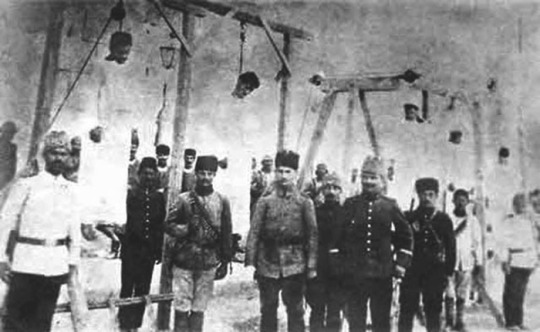
Djemal Pasha, the Ottoman minister of the navy, publicly executed Syrian nationalists who espoused and disseminated anti-Ottoman viewpoints and agitated against the Ottoman military presence in Syria. Both plazas have since been renamed Martyrs' Square.
#May.6.1916#Martyrs' Day#Djemal Pasha#Al Jazzar#publicly executed#Martyrs' Square#Marjeh Square in Damascus#Burj Square in Beirut#history today
0 notes
Text
Talaat Pasha's Official Orders Regarding the Armenian Massacres, March 1915-January 1916
March 25th, 1915
To Djemal Bey, Delegate at Adana:
The duty of everyone is to effect on the broadest lines possible the realization of the noble project of wiping out of existence the well-known elements [note: Armenians] who for centuries have been the barrier to the empire's progress in civilization.
We must, therefore, take upon ourselves the entire responsibility, pledging ourselves to this action no matter what happens, and always remembering how great is the sacrifice which the Government has made in entering the World War. We must work so that the means used may lead to the desired end.
In our dispatch dated February 18th, we announced that the Djemiet has decided to uproot and annihilate the different forces which for centuries have been a hindrance; for this purpose it is forced to resort to very bloody methods. Certainly the contemplation of these methods horrified us, but the Djemiet saw no other way of insuring the stability of its work.
Ali Riza [Note: the committee delegate at Aleppo] harshly criticised us and urged that we be merciful; such simplicity is nothing short of stupidity. We will find a place for all those who will not cooperate with us, a place that will wring their delicate heartstrings.
Again let me remind you of the question of property left. This is very important. Watch its distribution with vigilance; always examine the accounts and the use made of the proceeds.
THE DJEMIET
[source]
101 notes
·
View notes
Text
Events 5.6 (before 1940)
1527 – Spanish and German troops sack Rome; many scholars consider this the end of the Renaissance.
1536 – The Siege of Cuzco commences, in which Incan forces attempt to retake the city of Cuzco from the Spanish.
1541 – King Henry VIII orders English-language Bibles be placed in every church. In 1539 the Great Bible would be provided for this purpose.
1542 – Francis Xavier reaches Old Goa, the capital of Portuguese India at the time.
1594 – The Dutch city of Coevorden held by the Spanish, falls to a Dutch and English force.
1659 – English Restoration: A faction of the British Army removes Richard Cromwell as Lord Protector of the Commonwealth and reinstalls the Rump Parliament.
1682 – Louis XIV of France moves his court to the Palace of Versailles.
1757 – Battle of Prague: A Prussian army fights an Austrian army in Prague during the Seven Years' War.
1757 – The end of Konbaung–Hanthawaddy War, and the end of Burmese Civil War (1740–1757).
1757 – English poet Christopher Smart is admitted into St Luke's Hospital for Lunatics in London, beginning his six-year confinement to mental asylums.
1782 – Construction begins on the Grand Palace, the royal residence of the King of Siam in Bangkok, at the command of King Buddha Yodfa Chulaloke.
1801 – Captain Thomas Cochrane in the 14-gun HMS Speedy captures the 32-gun Spanish frigate El Gamo.
1835 – James Gordon Bennett, Sr. publishes the first issue of the New York Herald.
1840 – The Penny Black postage stamp becomes valid for use in the United Kingdom of Great Britain and Ireland.
1857 – The East India Company disbands the 34th Regiment of Bengal Native Infantry whose sepoy Mangal Pandey had earlier revolted against the British in the lead up to the War of Indian Independence.
1861 – American Civil War: Arkansas secedes from the Union.
1863 – American Civil War: The Battle of Chancellorsville ends with the defeat of the Army of the Potomac by the Army of Northern Virginia.
1877 – Chief Crazy Horse of the Oglala Lakota surrenders to United States troops in Nebraska.
1882 – Thomas Henry Burke and Lord Frederick Cavendish are stabbed to death by Fenian assassins in Phoenix Park, Dublin.
1882 – The United States Congress passes the Chinese Exclusion Act.
1889 – The Eiffel Tower is officially opened to the public at the Universal Exposition in Paris.
1901 – The first issue of Gorkhapatra, the oldest still running state-owned Nepali newspaper was published.
1906 – The Russian Constitution of 1906 is adopted (on April 23 by the Julian calendar).
1910 – George V becomes King of Great Britain, Ireland, and many overseas territories, on the death of his father, Edward VII.
1915 – Babe Ruth, then a pitcher for the Boston Red Sox, hits his first major league home run.
1915 – Imperial Trans-Antarctic Expedition: The SY Aurora broke loose from its anchorage during a gale, beginning a 312-day ordeal.
1916 – Twenty-one Lebanese nationalists are executed in Martyrs' Square, Beirut by Djemal Pasha.
1916 – Vietnamese Emperor Duy Tân is captured while calling upon the people to rise up against the French, and is later deposed and exiled to Réunion island.
1933 – The Deutsche Studentenschaft attacked Magnus Hirschfeld's Institut für Sexualwissenschaft, later burning many of its books.
1935 – New Deal: Under the authority of the newly-enacted Federal Emergency Relief Administration, President Franklin D. Roosevelt issues Executive Order 7034 to create the Works Progress Administration.
1937 – Hindenburg disaster: The German zeppelin Hindenburg catches fire and is destroyed within a minute while attempting to dock at Lakehurst, New Jersey. Thirty-six people are killed.
0 notes
Text
Turkey Exits the War
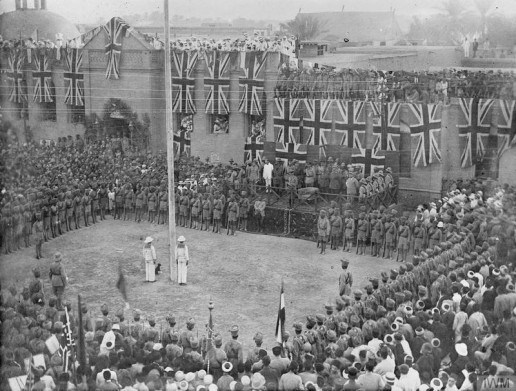
The Armistice of Mudros is announced in British-occupied Baghdad on October 31.
October 30 1918, Mudros--With Bulgaria’s collapse opening the way to Constantinople, the new Ottoman government quickly asked for an armistice. Negotiating with the British alone, they received stricter terms than they were hoping for, but were nonetheless compelled to accept. The armistice, signed on the pre-dreadnought Agamemnon on the evening of October 30, went into effect at noon the following day. Turkey would open the straits at the Dardanelles and Bosporus, and hand over control of their forts to the Allies. The Turks would demobilize entirely, and surrender any remaining garrisons in Syria, Mesopotamia, Arabia, and Yemen. All Allied prisoners of war and any remaining Armenians interned during the genocide would be handed over to the Allies, while Turkish PoWs would remain in Allied hands. Finally, the Allies were given the blanket right to “occupy any strategic point in case of a threat to their security.”
When the armistice came into effect, the British had were on the border of European Turkey with Bulgaria; per the terms of the armistice, they moved on Constantinople, arriving there on November 12, joined by a fleet that had sailed peacefully through the Dardanelles. The Young Turk leadership, including Enver, Talaat, and Djemal Pashas, fled the city by German U-boat on November 1. In Syria, Allenby’s forces were between Haritan and Alexandretta. In Mesopotamia, British forces had hurriedly pushed north in the last week of October to secure British interests there before the end of the war, and on the day the armistice was signed they forced the surrender of most of the Turkish forces in the area. However, by the time news of the armistice reached the area on November 1, they were still twelve miles south of Mosul. Nevertheless, the British occupied the city on November 4, despite the Turks’ insistence that Mosul was not part of Mesopotamia and thus did not need to be surrendered under the terms of the armistice. The British decision to ignore these objections would have profound consequences for the future of Iraq.
Today in 1917: Hertling New German Chancellor
Today in 1916: Sherif Hussein Proclaims Himself “King of the Arab Nation”
Today in 1915: New Commander at Gallipoli Urges Evacuation
Today in 1914: Fisher Replaces Battenberg as First Sea Lord
Sources include: Cyril Falls, Armageddon, 1918; Charles Townshend, Desert Hell; Eugene Rogan, The Fall of the Ottomans.
#wwi#ww1#ww1 history#ww1 centenary#world war 1#world war i#world war one#the first world war#the great war#turkey#ottoman empire#enver pasha#Talaat Pasha#Djemal Pasha#mesopotamia#mosul
127 notes
·
View notes
Photo
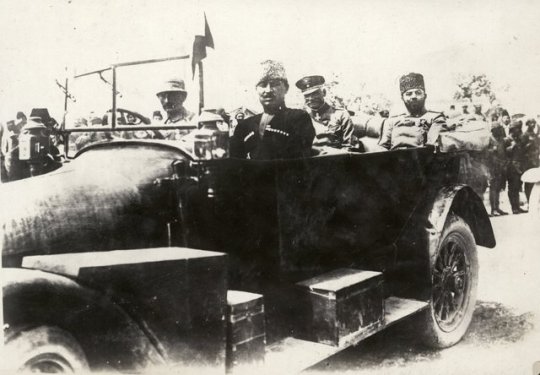
General Erich Von Falkenhayn and Djemal Pasha in a staff car somewhere in 1917 on the Syrian Front, WW1.
#erich von falkehayn#german#cemal#djemal pasha#1917#history#ww1#world war 1#first world war#syrian fort#car#ottoman
18 notes
·
View notes
Photo
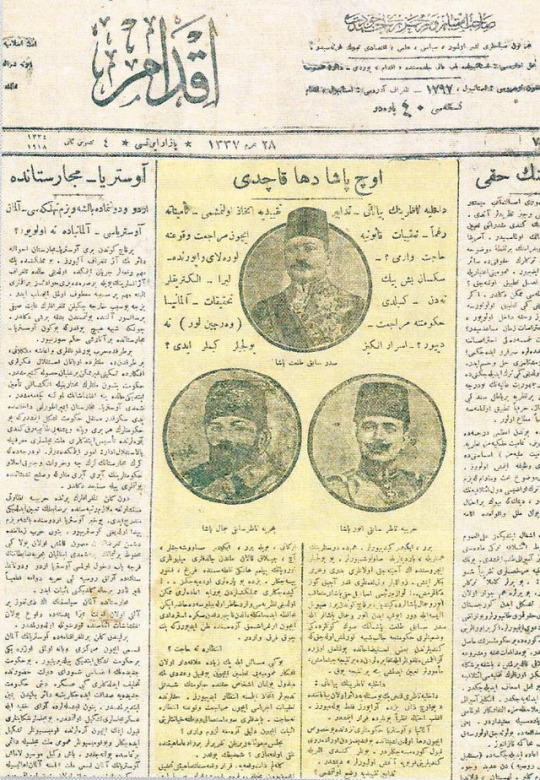
Front page of the Ottoman newspaper İkdam (November 4th, 1918), after the Three Pashas fled the country after being indicted for war crimes against the Armenians and Greeks. It reads, “Their response to eliminate the Armenian problem was the attempt the elimination of the Armenians themselves.”
#history#military history#journalism#armenian genocide#turkish courts-martial of 1919-20#ottoman empire#turkey#armenia#three pashas#mehmed talaat pasha#ismail enver pasha#ahmed djemal pasha
18 notes
·
View notes
Photo
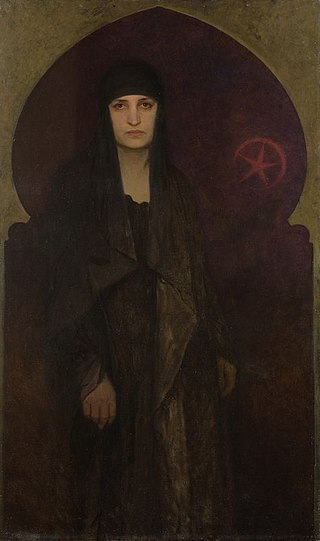
Alphonse Mucha Portrait of Halide Edib Adivar
Halide Edib Adıvar (11 June 1884 – 9 January 1964) was a Turkish novelist, nationalist, kemalist, teacher and political leader for women's rights. She was best known for her novels criticizing the low social status of Turkish women and what she saw from her observation as the lack of interest of most women in changing their situation.
During World War I, Halide Edib ran an orphanage with Djemal Pasha at the former Saint Joseph College in Antoura where orphans of the Armenian Genocide were forcibly converted to Islam and Turkified.
She was a Pan-Turkist and several of her novels promoted Turanism.
#Halide Edib Adıvar#women in history#XIX century#XX century#alphonse mucha#mucha#people#portrait#paintings#art#arte
16 notes
·
View notes
Photo
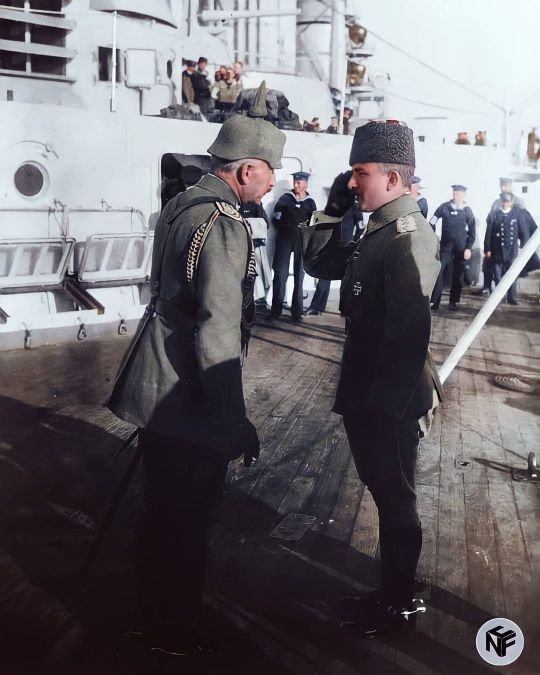
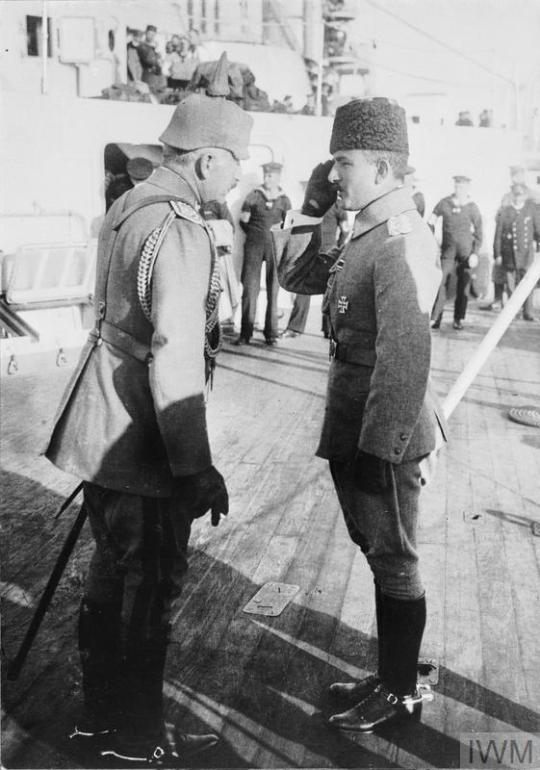
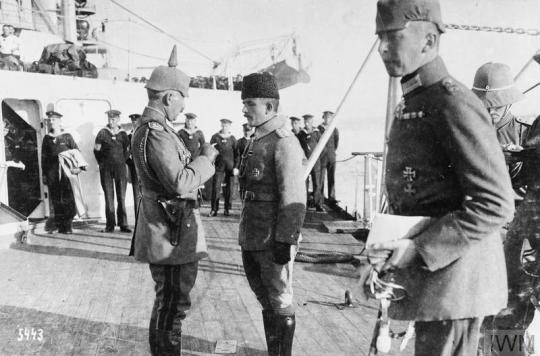
Oct 15 1917 During a tour of the Ottoman Empire a German photographer takes these photos of the Kaiser Wilhelm II meeting Enver Pasha, then the Turkish Minister of War, on board SMS Goeben (Yavuz Sultan Selim) at Constantinople.
After the Ottoman coup d’état of January 1913, Enver Pasha became one of the most powerful men of the Ottoman Empire, forming one-third of the triumvirate known as the "Three Pashas" (along with Talaat Pasha and Djemal Pasha) who held de facto rule over the Empire from 1913 until the end of #WWI.
IWM Q 69989, IWM Q 23732
Colourized by nfcolor
October 15 1917-10-15
29 notes
·
View notes
Text
1 note
·
View note
Photo

The Arabs of Syria
The Arabs of Syria demanded practically local self- government, and the Armenians, autonomy. The treasury was bankrupt and money could be secured from the powers only by valuable concessions. In the resulting scramble for concessions, Germany, France and Russia secured control of railroad expansion for the next generation.
Turkey resembled a sucked egg with an unbroken shell. The money secured by the con-cessions, instead of being used to consolidate Turkey’s Asiatic possessions and introduce sorely needed domestic reforms, was spent on the improvement of the army and the navy. Turkey was now governed by a triumvirate, Enver Pasha, minister of war, Talaat Bey, minister of the interior, and Djemal Bey, minister of foreign affairs, but of this triumvirate Enver Pasha was the Augustus. He placed upon the retired list some 300 army officers, among whom were some famous leaders not considered safe enough adherents of the Committee of Union and Progress.
Triple Alliance
He was, moreover, a pro-German and, despite the protests of Russia, invited General Liman von Sanders and a group of German officers to reorganize the army. The general soon became the guiding spirit of the Supreme Council of War. The government also invited a British naval commission to reorganize the navy, and two dreadnoughts were ordered built in England. Convinced that the Balkan Federation had been the work of Russia, and influenced by the skilful diplomacy of Germany, Turkey, while professing an independent foreign policy, was controlled by the Triple Alliance.
But its immediate foreign policy was dictated by a determination to secure possession by war, if necessary, of the islands taken by Greece, and in case of war with Greece it hoped to have the support of Bulgaria. To pay for the dreadnoughts, a “ patriotic” loan was started to which all wealthy Greeks in Turkey were “ invited” to contribute. Thousands of poor Greeks were compelled to emigrate penniless from recovered Thrace and from Asia Minor to make way for the thousands of Turks who were expelled, the Turkish government maintained, from the part of Macedonia secured by Greece by the terms of the Treaty of Bucharest.
0 notes
Photo

The Arabs of Syria
The Arabs of Syria demanded practically local self- government, and the Armenians, autonomy. The treasury was bankrupt and money could be secured from the powers only by valuable concessions. In the resulting scramble for concessions, Germany, France and Russia secured control of railroad expansion for the next generation.
Turkey resembled a sucked egg with an unbroken shell. The money secured by the con-cessions, instead of being used to consolidate Turkey’s Asiatic possessions and introduce sorely needed domestic reforms, was spent on the improvement of the army and the navy. Turkey was now governed by a triumvirate, Enver Pasha, minister of war, Talaat Bey, minister of the interior, and Djemal Bey, minister of foreign affairs, but of this triumvirate Enver Pasha was the Augustus. He placed upon the retired list some 300 army officers, among whom were some famous leaders not considered safe enough adherents of the Committee of Union and Progress.
Triple Alliance
He was, moreover, a pro-German and, despite the protests of Russia, invited General Liman von Sanders and a group of German officers to reorganize the army. The general soon became the guiding spirit of the Supreme Council of War. The government also invited a British naval commission to reorganize the navy, and two dreadnoughts were ordered built in England. Convinced that the Balkan Federation had been the work of Russia, and influenced by the skilful diplomacy of Germany, Turkey, while professing an independent foreign policy, was controlled by the Triple Alliance.
But its immediate foreign policy was dictated by a determination to secure possession by war, if necessary, of the islands taken by Greece, and in case of war with Greece it hoped to have the support of Bulgaria. To pay for the dreadnoughts, a “ patriotic” loan was started to which all wealthy Greeks in Turkey were “ invited” to contribute. Thousands of poor Greeks were compelled to emigrate penniless from recovered Thrace and from Asia Minor to make way for the thousands of Turks who were expelled, the Turkish government maintained, from the part of Macedonia secured by Greece by the terms of the Treaty of Bucharest.
0 notes
Photo

The Arabs of Syria
The Arabs of Syria demanded practically local self- government, and the Armenians, autonomy. The treasury was bankrupt and money could be secured from the powers only by valuable concessions. In the resulting scramble for concessions, Germany, France and Russia secured control of railroad expansion for the next generation.
Turkey resembled a sucked egg with an unbroken shell. The money secured by the con-cessions, instead of being used to consolidate Turkey’s Asiatic possessions and introduce sorely needed domestic reforms, was spent on the improvement of the army and the navy. Turkey was now governed by a triumvirate, Enver Pasha, minister of war, Talaat Bey, minister of the interior, and Djemal Bey, minister of foreign affairs, but of this triumvirate Enver Pasha was the Augustus. He placed upon the retired list some 300 army officers, among whom were some famous leaders not considered safe enough adherents of the Committee of Union and Progress.
Triple Alliance
He was, moreover, a pro-German and, despite the protests of Russia, invited General Liman von Sanders and a group of German officers to reorganize the army. The general soon became the guiding spirit of the Supreme Council of War. The government also invited a British naval commission to reorganize the navy, and two dreadnoughts were ordered built in England. Convinced that the Balkan Federation had been the work of Russia, and influenced by the skilful diplomacy of Germany, Turkey, while professing an independent foreign policy, was controlled by the Triple Alliance.
But its immediate foreign policy was dictated by a determination to secure possession by war, if necessary, of the islands taken by Greece, and in case of war with Greece it hoped to have the support of Bulgaria. To pay for the dreadnoughts, a “ patriotic” loan was started to which all wealthy Greeks in Turkey were “ invited” to contribute. Thousands of poor Greeks were compelled to emigrate penniless from recovered Thrace and from Asia Minor to make way for the thousands of Turks who were expelled, the Turkish government maintained, from the part of Macedonia secured by Greece by the terms of the Treaty of Bucharest.
0 notes
Text
Events 5.6
1527 – Spanish and German troops sack Rome; many scholars consider this the end of the Renaissance.
1536 – The Siege of Cuzco commences, in which Incan forces attempt to retake the city of Cuzco from the Spanish.
1541 – King Henry VIII orders English-language Bibles be placed in every church. In 1539 the Great Bible would be provided for this purpose.
1542 – Francis Xavier reaches Old Goa, the capital of Portuguese India at the time.
1593 – The Dutch city of Coevorden held by the Spanish, falls to a Dutch and English force.
1659 – English Restoration: A faction of the British Army removes Richard Cromwell as Lord Protector of the Commonwealth and reinstalls the Rump Parliament.
1682 – Louis XIV of France moves his court to the Palace of Versailles.
1757 – Battle of Prague: A Prussian army fights an Austrian army in Prague during the Seven Years' War.
1757 – The end of Konbaung–Hanthawaddy War, and the end of Burmese Civil War (1740–1757).
1757 – English poet Christopher Smart is admitted into St Luke's Hospital for Lunatics in London, beginning his six-year confinement to mental asylums.
1782 – Construction begins on the Grand Palace, the royal residence of the King of Siam in Bangkok, at the command of King Buddha Yodfa Chulaloke.
1801 – Captain Thomas Cochrane in the 14-gun HMS Speedy captures the 32-gun Spanish frigate El Gamo.
1835 – James Gordon Bennett, Sr. publishes the first issue of the New York Herald.
1840 – The Penny Black postage stamp becomes valid for use in the United Kingdom of Great Britain and Ireland.
1857 – The East India Company disbands the 34th Regiment of Bengal Native Infantry whose sepoy Mangal Pandey had earlier revolted against the British in the lead up to the War of Indian Independence.
1861 – American Civil War: Arkansas secedes from the Union.
1863 – American Civil War: The Battle of Chancellorsville ends with the defeat of the Army of the Potomac by the Army of Northern Virginia.
1877 – Chief Crazy Horse of the Oglala Lakota surrenders to United States troops in Nebraska.
1882 – Thomas Henry Burke and Lord Frederick Cavendish are stabbed to death by Fenian assassins in Phoenix Park, Dublin.
1882 – The United States Congress passes the Chinese Exclusion Act.
1889 – The Eiffel Tower is officially opened to the public at the Universal Exposition in Paris.
1901 – The first issue of Gorkhapatra, the oldest still running state-owned Nepali newspaper was published.
1906 – The Russian Constitution of 1906 is adopted (on April 23 by the Julian calendar).
1910 – George V becomes King of Great Britain, Ireland, and many overseas territories, on the death of his father, Edward VII.
1915 – Babe Ruth, then a pitcher for the Boston Red Sox, hits his first major league home run.
1915 – Imperial Trans-Antarctic Expedition: The SY Aurora broke loose from its anchorage during a gale, beginning a 312-day ordeal.
1916 – Twenty-one Lebanese nationalists are executed in Martyrs' Square, Beirut by Djemal Pasha.
1916 – Vietnamese Emperor Duy Tân is captured while calling upon the people to rise up against the French, and is later deposed and exiled to Réunion island.
1933 – The Deutsche Studentenschaft attacked Magnus Hirschfeld's Institut für Sexualwissenschaft, later burning many of its books.
1935 – New Deal: Under the authority of the newly-enacted Federal Emergency Relief Administration, President Franklin D. Roosevelt issues Executive Order 7034 to create the Works Progress Administration.
1937 – Hindenburg disaster: The German zeppelin Hindenburg catches fire and is destroyed within a minute while attempting to dock at Lakehurst, New Jersey. Thirty-six people are killed.
1940 – John Steinbeck is awarded the Pulitzer Prize for his novel The Grapes of Wrath.
1941 – At California's March Field, Bob Hope performs his first USO show.
1941 – The first flight of the Republic P-47 Thunderbolt.
1942 – World War II: On Corregidor, the last American forces in the Philippines surrender to the Japanese.
1945 – World War II: Axis Sally delivers her last propaganda broadcast to Allied troops.
1945 – World War II: The Prague Offensive, the last major battle of the Eastern Front, begins.
1949 – EDSAC, the first practical electronic digital stored-program computer, runs its first operation.
1954 – Roger Bannister becomes the first person to run the mile in under four minutes.
1960 – More than 20 million viewers watch the first televised royal wedding when Princess Margaret marries Anthony Armstrong-Jones at Westminster Abbey.
1966 – Myra Hindley and Ian Brady are sentenced to life imprisonment for the Moors murders in England.
1972 – Deniz Gezmiş, Yusuf Aslan and Hüseyin İnan are executed in Ankara after being convicted of attempting to overthrow the Constitutional order.
1975 – During a lull in fighting, 100,000 Armenians gather in Beirut for the 60th anniversary commemorations of the Armenian genocide.
1976 – The 6.5 Mw Friuli earthquake affected Northern Italy with a maximum Mercalli intensity of X (Extreme), leaving 900–978 dead and 1,700–2,400 injured.
1983 – The Hitler Diaries are revealed as a hoax after being examined by new experts.
1984 – One hundred and three Korean Martyrs are canonized by Pope John Paul II in Seoul.
1988 – All thirty-six passengers and crew were killed when Widerøe Flight 710 crashed into Mt. Torghatten in Brønnøy.
1994 – Elizabeth II of the United Kingdom and French President François Mitterrand officiate at the opening of the Channel Tunnel.
1996 – The body of former CIA director William Colby is found washed up on a riverbank in southern Maryland, eight days after he disappeared.
1997 – The Bank of England is given independence from political control, the most significant change in the bank's 300-year history.
1998 – Kerry Wood strikes out 20 Houston Astros to tie the major league record held by Roger Clemens. He threw a one-hitter and did not walk a batter in his fifth career start.
1998 – Steve Jobs of Apple Inc. unveils the first iMac.
1999 – The first elections to the devolved Scottish Parliament and Welsh Assembly are held.
2001 – During a trip to Syria, Pope John Paul II becomes the first pope to enter a mosque.
2002 – Dutch politician Pim Fortuyn is assassinated following a radio-interview at the Mediapark in Hilversum.
2002 – Founding of SpaceX.
2010 – In just 36 minutes, the Dow-Jones average plunged nearly 1,000 points in what is known as the 2010 Flash Crash.
2013 – Three women, kidnapped and missing for more than a decade, are found alive in Cleveland, Ohio, in the United States.
1 note
·
View note
Text
Haydarpasha Munitions Explosion Sets Back Turkish Operations in Palestine
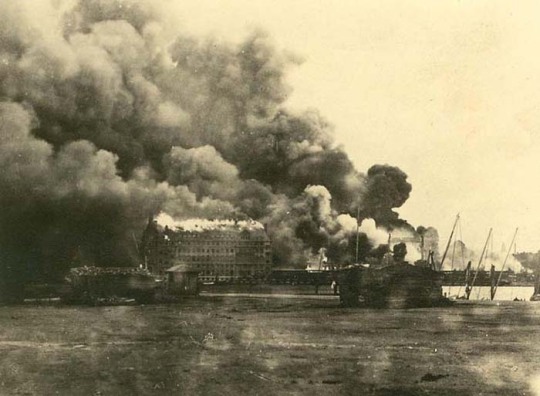
The aftermath of the explosion at Haydarpaşa station.
September 6 1917, Haydarpaşa--The new joint German-Turkish Yildirim Army Group had originally been tasked with retaking Baghdad by Enver Pasha, despite strenuous objections from Djemal Pasha, commanding the Fourth Army in Syria, who felt the force would be better used as a strategic reserve to respond to an Allied offensive from any direction. Djemal continued to protest over the course of the summer, and in mid-August, with Falkenhayn’s backing, finally got Enver to call off the attack on Baghdad.
Djemal soon came to regret this, however, realizing that Falkenhayn could now challenge his military authority in Syria and Palestine. On September 5, Falkenhayn decided that he would use Yildirim to attack in Palestine. The British were performing a worrying buildup there, and the Russians were no longer a threat in the Caucasus. He hoped to push the British back across the Sinai, and that his German divisions could finally force the Suez Canal. Mustafa Kemal, whose Seventh Army would be responsible for this offensive, protested fervently to Enver. His army was in no condition to conduct an offensive, and no reserves to back them up; one of his divisions had lost more than half of its strength just in the journey from Constantinople to Aleppo. Politically, he also chafed at being under the command of the German Falkenhayn.
Furthermore, the large quantities of materiel sent by the Germans for Yildirim were much diminished on September 6, when a massive explosion at Haydarpaşa station (the Asian terminus of the planned railway to Baghdad, across the Bosporus from Constantinople) destroyed much of them. Yildirim, short on men and supplies, would not begin its march south from Aleppo until the end of the month. Mustafa Kemal would not be with them, as he resigned in protest before they began to move out.
Today in 1916: PM Asquith Visits the Somme
Today in 1915: Bulgaria Agrees to Join War Against Serbia & Allies
Today in 1914: Austrians Attempt to Envelop Russians at Rava-Ruska
Sources include: Roger Ford, Eden to Armageddon; Eugene Rogan, The Fall of the Ottomans.
#wwi#ww1#ww1 history#ww1 centenary#world war 1#world war i#world war one#the great war#yildirim#falkenhayn#Palestine#ataturk#Djemal Pasha#enver pasha#Enver Paşa#mustafa kemal atatürk#ottoman empire#turkey#september 1917
46 notes
·
View notes
Photo

The Arabs of Syria
The Arabs of Syria demanded practically local self- government, and the Armenians, autonomy. The treasury was bankrupt and money could be secured from the powers only by valuable concessions. In the resulting scramble for concessions, Germany, France and Russia secured control of railroad expansion for the next generation.
Turkey resembled a sucked egg with an unbroken shell. The money secured by the con-cessions, instead of being used to consolidate Turkey’s Asiatic possessions and introduce sorely needed domestic reforms, was spent on the improvement of the army and the navy. Turkey was now governed by a triumvirate, Enver Pasha, minister of war, Talaat Bey, minister of the interior, and Djemal Bey, minister of foreign affairs, but of this triumvirate Enver Pasha was the Augustus. He placed upon the retired list some 300 army officers, among whom were some famous leaders not considered safe enough adherents of the Committee of Union and Progress.
Triple Alliance
He was, moreover, a pro-German and, despite the protests of Russia, invited General Liman von Sanders and a group of German officers to reorganize the army. The general soon became the guiding spirit of the Supreme Council of War. The government also invited a British naval commission to reorganize the navy, and two dreadnoughts were ordered built in England. Convinced that the Balkan Federation had been the work of Russia, and influenced by the skilful diplomacy of Germany, Turkey, while professing an independent foreign policy, was controlled by the Triple Alliance.
But its immediate foreign policy was dictated by a determination to secure possession by war, if necessary, of the islands taken by Greece, and in case of war with Greece it hoped to have the support of Bulgaria. To pay for the dreadnoughts, a “ patriotic” loan was started to which all wealthy Greeks in Turkey were “ invited” to contribute. Thousands of poor Greeks were compelled to emigrate penniless from recovered Thrace and from Asia Minor to make way for the thousands of Turks who were expelled, the Turkish government maintained, from the part of Macedonia secured by Greece by the terms of the Treaty of Bucharest.
0 notes